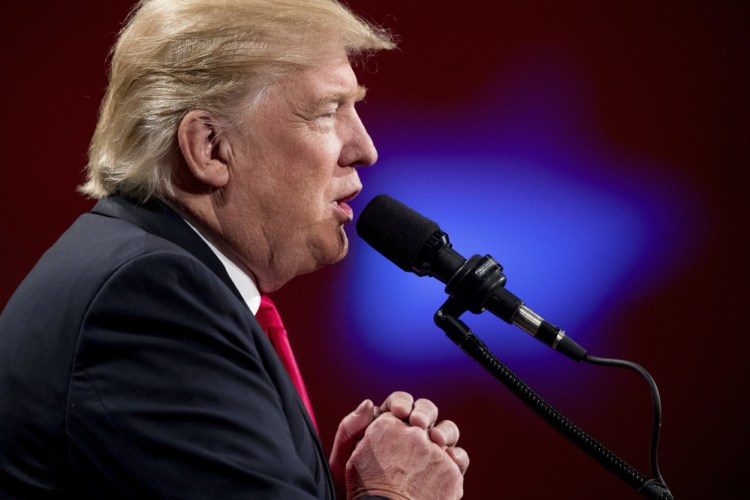WASHINGTON — President-elect Donald Trump, who won the hearts and minds of millions of working-class voters, may help deliver a multibillion-dollar bonanza to America’s wealthiest families.
The Manhattan businessman’s election offers congressional Republicans their best chance in years to eliminate the estate tax, which he and others call the “death tax.” Abolishing it would save more than $20 billion a year for the millionaires and billionaires the tax applies to — including the Trump family and several of the people he has chosen for his administration.
“A lot of families go through hell over the death tax,” Trump said during his presidential run. The tax’s opponents say it forces some families to sell their farms or small businesses in order to pay up. Studies suggest that only a small percentage of estates fall into those categories.
Wiping out the estate tax has been a longstanding goal for Republican lawmakers, and the party’s sweeping victories in the 2016 election have brought them thrillingly close to achieving it. But there are potential stumbling blocks. Their narrow margin in the Senate leaves few votes to spare. And Trump may have a hard time reconciling his populist campaign themes with a tax break for America’s richest.
Under federal law, the tax, which is levied at a 40 percent rate, applies only to estates worth more than $5.45 million for individuals and $10.9 million for couples. Estates worth less than that may be passed on to heirs tax-free. Last year, just 0.2 percent of estates of people who died were subject to the tax, according to estimates by the Tax Policy Center, a Washington-based research group that’s a joint venture of the Urban Institute and the Brookings Institution.
Trump “campaigned as someone who’s going to help the middle class, the forgotten guy, but every policy he’s advocating — huge tax cuts for the wealthy, estate tax — all for the top .001 percent,” said Rep. Jerry Nadler, a Democrat from Manhattan.
America’s wealthiest “hit the jackpot” with Trump’s election, he said.
Since Trump’s election, House Ways & Means Chairman Kevin Brady and Senate Finance Chairman Orrin Hatch have repeated their desire to repeal the estate tax. House Speaker Paul Ryan and Senate Majority Leader Mitch McConnell have long supported its elimination. Passage in the Republican-led House is assured. In the Senate, a decade-long estate tax repeal can pass with 50 of 52 expected GOP senators under a special mechanism called reconciliation, while 60 votes could end it for good.
“The death tax on family farms, small businesses, ranches and estates has crippled hard-working families for far too long,” Hatch told Bloomberg News in a statement.
In 2013, 120 of the 3,780 estates subject to the tax were farms and businesses, according to the Tax Policy Center. That’s a little more than 3 percent. The same year, estates valued above $20 million paid an average tax rate of 18.8 percent — many achieve a lower effective rate through tax-planning strategies, including giving some of their fortune away to charity.
At that 18.8 percent effective rate, repealing the tax would be a large windfall to the leaders-in-waiting of the Trump administration.
Trump’s estate would save $564 million, based on his estimated net worth of $3 billion. Trump disagrees with that net-worth estimate, which Bloomberg News compiled in July; he has said his net worth exceeds $10 billion. If so, his savings would increase — to as much as $1.9 billion at an 18.8 percent effective tax rate. Trump’s transition team didn’t respond to a request for comment for this story.
Trump’s Commerce secretary choice, Wilbur Ross, might save about $545 million, based on his estimated net worth of $2.9 billion. Ross is the chairman and chief strategy officer of WL Ross & Co. LLC. Richard DeVos, the father-in-law of Trump’s education secretary choice, Betsy DeVos, might save $900 million, based on his estimated $4.8 billion net worth. Richard DeVos is co-founder of Alticor Inc., the parent of closely held direct-seller Amway Corp. Their net worth estimates were compiled by the Bloomberg Billionaires Index.
Repealing the tax would also benefit Treasury secretary nominee Steven Mnuchin, who held shares in CIT Group Inc. worth more than $100 million as of Dec. 2. And Linda McMahon, Trump’s pick to head the Small Business Administration, and her husband, Vince McMahon, have earned hundreds of millions of dollars after founding World Wrestling Entertainment Inc.
Send questions/comments to the editors.



Success. Please wait for the page to reload. If the page does not reload within 5 seconds, please refresh the page.
Enter your email and password to access comments.
Hi, to comment on stories you must . This profile is in addition to your subscription and website login.
Already have a commenting profile? .
Invalid username/password.
Please check your email to confirm and complete your registration.
Only subscribers are eligible to post comments. Please subscribe or login first for digital access. Here’s why.
Use the form below to reset your password. When you've submitted your account email, we will send an email with a reset code.